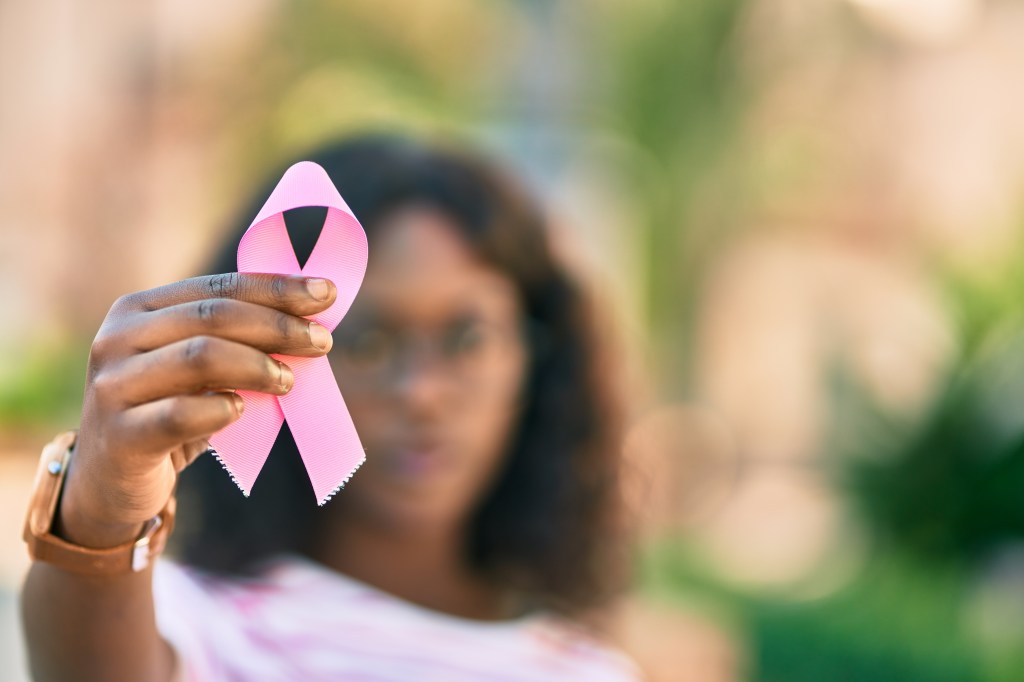For the past 45 years, Reverend Dr. Tammie Denyse has known that she would not live out the generational curse of self-abandonment that Black women inherited.
“If we look at Black American women and we even go back to slavery, Black American women were taught to take care of others. We weren’t taught to take care of ourselves,” she tells SheKnows. “We weren’t taught to even know what we needed. If someone were to ask us if we needed help, we weren’t taught what that all looks like.”
In 2004, Dr. Denyse started a nonprofit organization, Carrie’s TOUCH, with her now-late sister Lynne Rankin-Cochran who battled bladder cancer until her passing in 2013. Their work has brought Black women surviving breast cancer into a community driven by education and advocacy. But the organization wasn’t named after someone with the disease; it was named after her late mother who was killed by her abusive husband when Denyse was just 14 years old.
“A lot of people think that Carrie, the namesake for the organization, actually passed from breast cancer. She didn’t. She was a sufferer of domestic violence,” Denyse points out. “And I believe, had my mom been empowered to say ‘no,’ A. She would have never gotten into that bad marriage. B, she would have never took the abuse that she took C, she wouldn’t have taken it as long as she took it, and D, it wouldn’t have ultimately taken her life. I knew as a young girl that that would not be my trajectory, and I was determined then, 45 years ago, to have a different outcome for my life.”
Just as lineage sits at the root of her work, so does personal experience. After an admittedly “ignorant and insensitive” reaction to a woman at her church who was receiving chemotherapy for breast cancer, Dr. Denyse was diagnosed with the same disease a year later, getting the news while she was in the car with her three children. “I was more offended that the doctor didn’t receive the fact that I said, ‘No, this isn’t a good time to have this conversation’ than her actually telling me I had breast cancer,” Dr. Denyse says. It was the beginning of a journey that would find her breaking down the ways of Black women’s past even further.
Carrie’s TOUCH has gathered a bevy of breast cancer resources for Black women on their mobile app, a first of its kind. The app includes educational videos and various other means of support, including free or low-cost therapy, financial assistance, oncologist recommendations and social support through groups in-person and online. The organization also produces a podcast entitled No Longer Silent: Patient Access Stories, which highlights the stories of Black people navigating the healthcare system. Carrie’s TOUCH is also leading the charge in research geared toward Black women with initiatives like Project SOAR, a series of focus groups exploring the relationship between breast cancer and the “strong Black woman” schema through the African concept of “Ubuntu,”meaning “humanity to others”. The non-profit’s multi-pronged approach mirrors the long, winding road towards healthcare equality for Black women.

Reverend Dr. Tammi Denyse, co-founder and president of Carrie’s TOUCH
Courtesy of Carrie’s TOUCH
The statistics for Black women with breast cancer tell a harrowing story; perhaps the most well-known is the death rate for Black women with the disease, which is 41 percent higher than that of white women, per the Breast Cancer Research Foundation. There is also, however, the significant levels of anxiety and depression symptoms that Black breast cancer patients experience, and the glaring disparity in private health insurance and access to quality care. Dr. Denyse is staunch in her efforts to “dismantle the 41 percent,” criticism be damned. “The problem is that the needle hasn’t moved,” she says. “I knew 20 years ago that they weren’t putting the resources into saving Black women’s lives the way they were putting resources into saving white women’s lives.” Detractors have tried to challenge her, but she’s firm in her fight for inclusion where it counts. “When you don’t have adequate representation in clinical trials which inform what type of resources and medications and even policy is available to us, when the data is skewed, it’s missing the melting pot of people that are in this country and it leaves us, 20 years down the road, reciting the same statistic.”
Research has also shown a direct relationship between support and survival. In a study on Black breast cancer patients published in Social Science & Medicine, an important link was made: “Women whose social support declined during the first year after diagnosis reported more severe depressive symptoms and worse general health perceptions at two years.” Dr. Denyse underscores the importance of communal support by turning a popular phrase on its ear. “I have recently started saying, ‘Yeah, black don’t crack on the outside, but if you come on the inside there’s a lot of broken pieces internally.’ I think when we are in community, we get to share the burden.”
Thankfully, there are a number of organizations working alongside Carrie’s TOUCH to reduce mortality rates for Black women with breast cancer. Longtime groups like the African American Breast Cancer Alliance and Sisters Network Inc boast decades of advocacy, while newer organizations continue to enter the space like For The Breast of Us and Touch BBCA (Black Breast Cancer Alliance). Each of these organizations offers specialized community services to Black women with breast cancer, including social support, education, advocacy, and forums for discussion. Through all of their work, Black women’s capacity to go it alone is beautifully challenged. “It’s not until you force people to sit down and you say, ‘Give me two people that you could call right this second, and they’d drop everything and be here with you. That’s your inner circle,’” Dr. Denyse explains. “We hear it all the time when somebody’s sick. ‘Hey? Just let me know if you need anything.’ Most people are waiting on the phone call, but we don’t make it.”
The disparities Black women face are also global and widespread throughout the African diaspora. In a colorful anecdote, Dr. Denyse shares that on a trip to Starbucks before her sister’s passing, they saw a cover image in The New York Times that featured a woman dying from breast cancer on the streets of Sierra Leone. She resolved to take her work to Africa from that moment—a manifestation that found her in Ghana not too long afterwards. On a visit led by Dr. Beatrice Wiafe, Dr. Denyse found herself laying hands on various women, sharing her survival story and letting them know that God has not forsaken them.
“Now I don’t tell you that story to talk about how great I am. I tell you that story to talk about the fact that we’re having this conversation around Black women with breast cancer. And there’s still a disparity that minimizes our survivorship rates,” Denyse passionately expresses. “We are not present in the research. We don’t have adequate support in community. And it’s because I believe we are not seen as human. Our humanity is not seen, which means you don’t see our need. You don’t have compassion for our pain. You don’t have love, generosity, and all the things that you need to survive this disease.”
A lack of humanity begets a lack of education in many cases. Though most are aware of more popular warnings like the significance of early detection, there are lesser-known facts that many are still learning. For example, if there is a history of breast cancer in your family, medical professionals advise you to start receiving mammograms 10 years earlier than the age your family member was diagnosed. There is also a difference between how you perform a self-exam on your breasts (which should happen regularly) and a clinical breast exam (which should be performed yearly). It’s the kind of information that’s vital for a community facing disproportionate death, and the kind of tips Denyse shares ad nauseam.
Like every powerful visionary, Dr. Denyse is motivated by the possibility of a better future, as evidenced in her bestselling book, The Power of Hope: Reclaiming Your Life After Tragedy. When asked what she dreams for Black women surviving breast cancer years from now, she draws inspiration from Dr. Martin Luther King’s famous speech at the March on Washington: “I dream that one day black women will survive this disease at the same rates that white women do. I dream of a day where all women are included in research, and there is a diversity minimum that has to be in a part of every single clinical trial that is conducted. I dream of new medications that might need to target Black and brown bodies that are not the same,” Denyse says with a piercing stare and utmost clarity. “I dream of more love and more compassion and more understanding. I dream that people can see Black women and our humanity, and know that we hurt too, and that we deserve love. We deserve to be cared for, we deserve to be able to cry, and not feel guilty or ashamed of it, of the tears.”
She’s careful, still, to leave room for Black women not to be everyone’s savior.
“And I dream of a sisterhood of support that we can call each other when we need our sister-friends and our sister-friends will be there, and if that sister-friend happens to be on a respite where she’s doing her own self-care. There’s no repercussions. We all need self-care. And if that’s that sister’s time for self-care, she’s not the appointed one for you in this season, and that is okay.”
Before you go, shop these thoughtful gifts for breast cancer patients and survivors:




